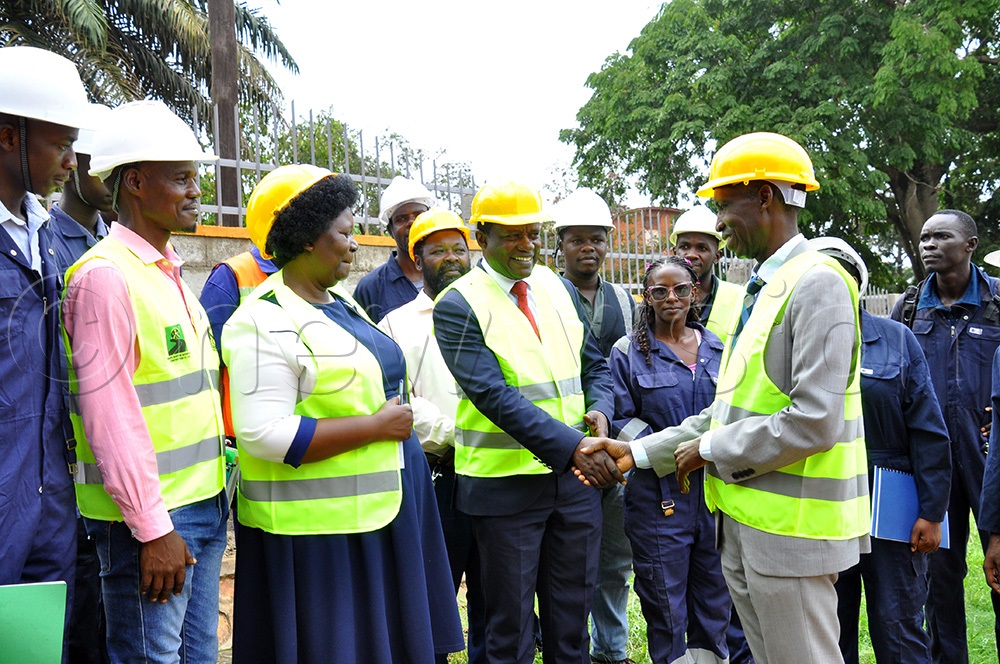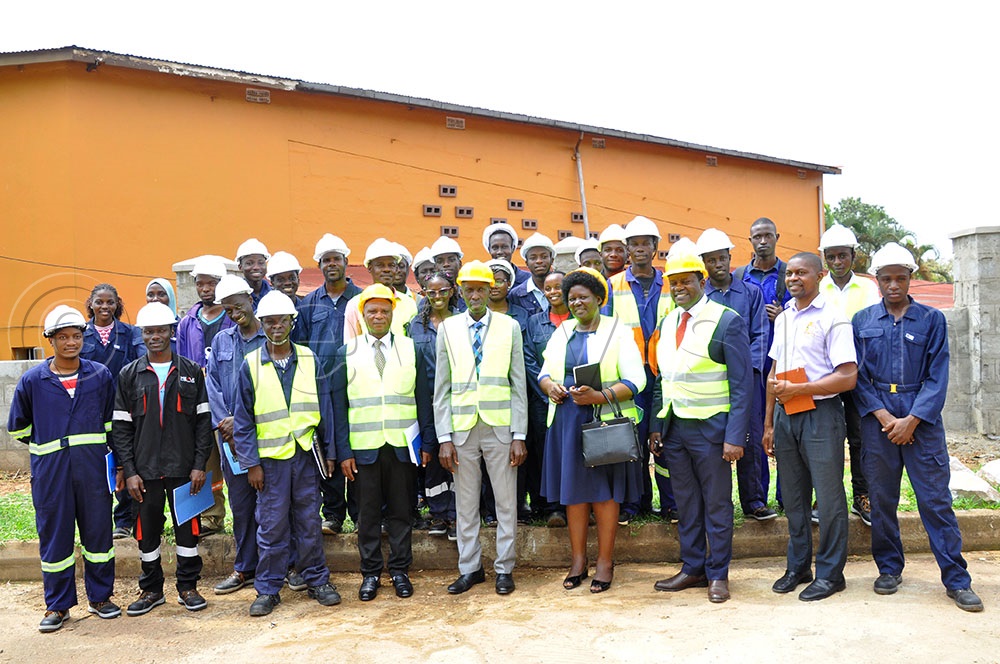Makerere pushes vocational training to tackle unemployment
The initiative, which started two years ago, aims to equip students with practical skills that enhance their employability and self-reliance.
(L-R) Oscar Mugula, Anthony Mugagga Muwagga Principal College of Education, Moses Musinguzi Principal College of Engineering, Jalia Nasaza Deputy Executive Secretary Uganda Vocational Technical Assessment Board (UVTAB), Martin Muyingo the Head teacher of Makerere College School and Eng Barnabas Mabonga lecturer launching the newly constructed fence by UVTAB technical students at Makerere University. (Photo by Nancy Nanyonga)
_________________
Makerere University has partnered with Makerere College School to provide vocational training for senior six graduates who are unable to afford university education.
The initiative, which started two years ago, aims to equip students with practical skills that enhance their employability and self-reliance.
As part of the collaboration, the university constructed a perimeter wall separating the two institutions and officially handed it over to the school administration on Wednesday, November 12, 2025. The project marks a key milestone in the ongoing partnership, which continues to create opportunities for learners through hands-on vocational programs.
(L-R) Eng Barnabas Mabonga lecturer, Jalia Nasaza Deputy Executive Secretary Uganda Vocational Technical Assessment Board (UVTAB) and engineering students look on as Martin Muyingo the Head teacher of Makerere College School interacts with Anthony Mugagga Muwagga Principal College of Education. (Photo by Nancy Nanyonga)
Speaking during the handover event at Makerere University, the university vice-chancellor, Prof. Barnabas Nawangwe, said the fully built perimeter wall is a true witness to real-life learning and teaching, something he said is most needed in today’s competitive world.
He noted that Makerere University has for 20 years been promoting student-based teaching and learning, innovations, knowledge-thought leadership and technology advancement for employability, something he says is evident in the institution’s previous and current strategic direction.
He revealed that Makerere’s strategic direction is premised on the country’s Fourth National Development Plan (NDPIV), Uganda's Vision 40, and the Sustainable Development Goal 4 (SDG IV), which he says envisions inclusive and equitable quality education as well as promotion of lifelong opportunities for all.
“I thank students and their tutors for the work well done. This is a ray of light shining on the path of progress and employment,” Nawangwe said.
Nawangwe stressed that the initiative is the will of President Yoweri Museveni, who he says has long emphasised lifelong learning as a hook for employment opportunities. He explained that the institution’s Centre for Life-long learning (CLL) directly responds to the Government’s human capital development agenda through the ruling National Resistance Movement (NRM) youth skilling programmes.
He noted that the CLL, which he said is tasked with taking the university to communities, has provided opportunities to the youth desiring to join vocational education, but is limited by financial support.
“Whenever the institution sets out to elevate society through skill empowerment, it is that noble role that they play. This is because knowledge acquired should directly reflect in the society’s efforts in solving its challenges,” Nawangwe said.
Nawangwe’s message was carried in his speech, presented on his behalf by Prof. Anthony Muwagga Mugagga, the Principal of Makerere University College of Education.
A total of 130 students who completed senior six final exams at Makerere College School but lack the capacity to join university, took on the project that has lasted them about five months. This was to construct a perimeter wall that separates Makerere University from Makerere College School.
Hands-on learning
On his part, College of Engineering, Design, and Technology (CEDAT) principal Prof. Moses Musinguzi said the project is a signal that students can put what they study in classrooms into real life, a move he says should be undertaken by other learning institutions.

He said most of the university building maintenance at Makerere University is done by students, a gesture he described as ‘profitable and self-reliant’.
“This is a good platform for learners to gain experience, skills and boost their confidence through hands-on learning. I’m grateful to God for having let me live to witness such developments in my lifetime,” Musinguzi said.
Jalia Nasaza, the deputy executive secretary at the Uganda Vocational and Technical Assessment Board (UVTAB), urged the public to embrace vocational learning, arguing that emerging technologies, such as Artificial Intelligence (AI), cannot replace vocational personnel like plumbers and constructors.
She hailed Makerere University for the move, especially in the areas of innovation, research and vocational development.
“I urge you to take on vocational learning; no technology can replace your space as plumbers, builders or bricklayers,” Nasaza said.
Makerere College School headteacher Dr Martin Muyingo said such initiatives are timely, especially as Uganda focuses its education on a skill-based model, urging institutions of learning to adapt.
He commended Makerere University for giving his school (Makerere College School) a platform to enhance its learners’ skills.
“Thank you, Makerere, for enabling our learners an opportunity to achieve their dreams through skills development. I hope other learning institutions can borrow a leaf from sustainable skills enhancement,” Muyingo said.